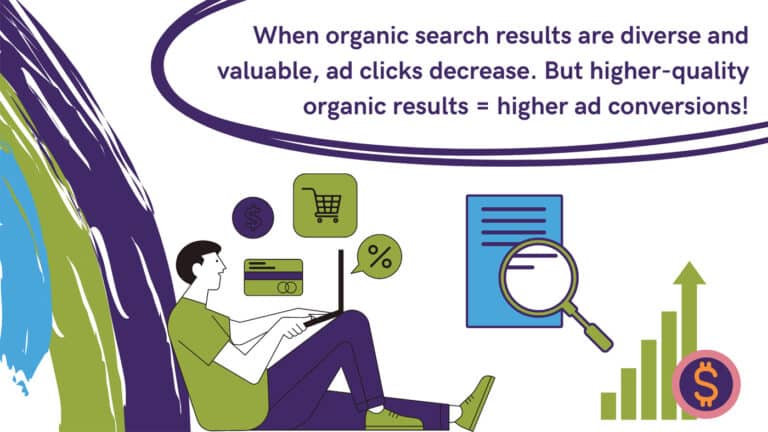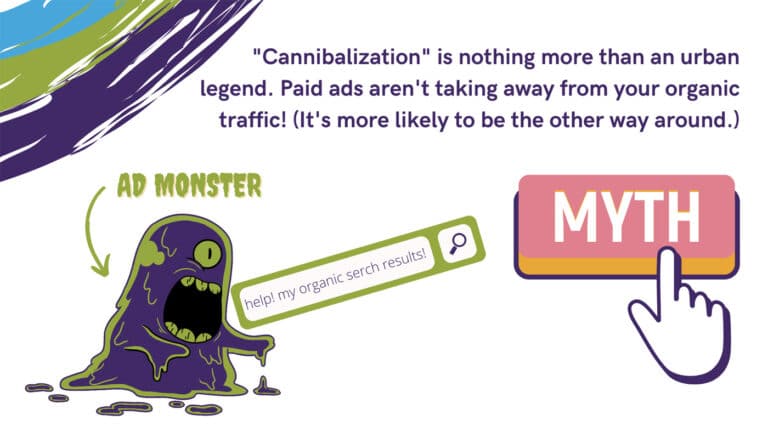Google holds a staggering 92.47% of search engine market share, so every business wants to appear in Google’s SERPs as much as possible. Small to medium businesses, in particular, need a well-designed strategy if they hope to level the playing field against larger competitors. And generally speaking, your clients will need both SEO and PPC to maximize their visibility in search results.
That said, the relationship between paid and organic search can be a multifaceted one. There’s a complex interplay between organic and paid search – and they don’t always play nice. In other words, the little details can have big consequences.
With that in mind, let’s take a closer look at how organic and paid search interact with one another… and whether your approach could help (or hurt) your success in SERPs.

What Do Paid and Organic Search Mean?
Paid and organic search provide two different ways to get noticed in Google search results. You might know paid search by another name, like Google Ads or PPC. These are the advertisements that appear at the very top of Google’s search results pages. Organic search refers to the results that appear below those ads. Google ranks organic results based on a number of factors, including topic and keyword relevance, user experience, and website authority.
In the SEO vs. PPC debate, some marketers will take sides. And although it’s true that one strategy could be better suited for certain situations than the other, that doesn’t mean that there’s a clear winner. Paid ads can often drive traffic to a website more quickly than what you’ll experience with SEO – but it can be tough to win both trust and clicks. While SEO takes time, it’s seen as an affordable way to improve both web visibility and credibility.
Ashish Agarwal, Associate Professor at the University of Texas at Austin and co-author of the study, “Do Organic Results Help or Hurt Sponsored Search Performance?” explains, “You could say, ‘If I have good organic listings, should I even care about having a paid ad?’ People have studied and found that both these listings complement each other and you should not avoid a paid ad.”
Still, there are patterns you’ll want to be aware of when you’re strategizing for your clients. When you understand the relationship between organic and paid search, you can set clearer expectations from the onset.
Help or Hurt: How Organic and Paid Search Interact
We know from Google that any investment a business makes in paid advertising has zero direct impact on their organic search results. Google reportedly “maintains a strict separation” between organic and paid search, meaning that no matter how much or little you spend on your Google Ads, that won’t cause your organic search ranking position to increase or decrease.
But that doesn’t mean that organic search results won’t ever impact paid ad performance. The perceived value of organic search results can influence ad clicks and conversions, while having a high-ranking site can correlate to higher Google Ads quality scores (and subsequent PPC performance).
Once we add the idiosyncrasies of user behavior to the equation, we start to see certain trends take shape.
Organic Search Impacts PPC Click Performance
The click performance of a given ad will largely depend on the organic results that appear on that same page. If the organic results that appear on page one for a given keyword are particularly helpful and diverse, your ad is less likely to be clicked.
Agarwal says, “The natural thought process is, because [ads are] what people first see, they’re more likely to click. From what I’ve seen and evaluated, people are wary of ads. If you’re comparing the effect of the click performance of top organic and top paid listings, the top organic gets more traffic because people don’t trust ads.”
In the data Agarwal and his study co-authors analyzed, the better the organic search results, the less frequently that any ads appearing on that same page were clicked.
Simply put, a lead probably isn’t going to click on your obvious ad if there are valuable organic results that already show up – especially if the lead is in the information-gathering stage. This goes to show how big a role search intent and user behavior can play in your strategy.
That doesn’t mean that having your client appear in both organic and paid search results on page one of SERPs will backfire, though. That scenario is actually to their benefit.
Agarwal says the combination of a paid ad and a related organic search result from the same site or company will increase brand familiarity and encourage clicks. “Let’s say I get a Best Buy listing as a top listing but an ad [for Best Buy] also shows up. It’s not going to hurt; it’s going to help.”
We know that web users are likely to avoid ads based on principle, even when ads take up the whole first part of a results page. But when an organic search result and a related ad appear in the same space, we typically see ad clicks increase. It’s only in completely distinct organic and paid search results with no website repetition that we see users preferring valuable organic results over Google Ads.
Better Organic Results = Better Ad Conversion Rates
Say your client isn’t yet appearing on page one of organic SERPs. Should you still run an ad? If the organic results for the keyword you’re targeting are valuable, the answer may be yes.
While it’s true that ads that appear on these pages tend to yield fewer clicks, there’s an important caveat to remember. If and when the ad is clicked, it’ll have a higher conversion rate.
“What we found is that looking at [ad] click performance, the click performance goes down if the quality of organic listings goes up,” Agarwal says. “But your conversion performance can actually improve if the quality of the organic listings goes up.”
It can be tough to convince web users to forgo organic results for paid ones. But once they cross that threshold and decide to click on an ad, they’re more likely to make a purchase.
Again, this speaks to user intent. If a consumer isn’t primed to purchase, they’ll turn to the SEO-driven results in the meantime. But after they’ve exhausted all of the best organic search results and are ready to buy, they’ll turn to paid search instead. Whether the organic results don’t provide enough quality information or they’re simply no longer a good fit for where the user is in their buyer’s journey, paid ad performance stands to benefit.
Remember: clicks aren’t everything! Conversions matter more for a client’s bottom line. An ad that receives a lot of clicks but comparatively few conversions won’t help your client succeed. Conversely, an ad that receives fewer clicks with a higher ratio of conversions is seen as far more effective and aligned with the needs of your audience. Don’t make the mistake of focusing on the wrong metrics.

Keyword Quality and User Intent Matter For Both Organic and Paid
With this information in mind, the question isn’t whether to pursue SEO or PPC. It’s more about how to win in both categories. In most cases, keyword research and selection will play a substantial part.
Agarwal explains that the keywords you choose for paid search, in particular, should align with your immediate goals. “If the objective is to have conversions [e.g., people making purchases], then I should pick long-tail keywords where there are good organic listings because good organic listings bring traffic to my site. If my objective is just to get traffic, I should avoid keywords where there are very good organic listings.”
So if you want to drive sales by reaching your ideal audience, bid on an ad search term that has some really valuable organic results already. But if you’re just looking to boost traffic, you could run an ad on a keyword that doesn’t bring up many valuable or relevant results.
What about when you factor competition into the mix? If a competitor is already ranking well organically on a keyword, it might not make as much sense for you or your client to run a paid search campaign. That’s especially true if the competitor source provides a lot of helpful information (which is often the case with high-ranking sites). It can be harder to overcome a competitor who already has the advantage in both arenas.
It’s not just about the competitiveness of keywords, however. When selecting your target search terms, you’ll also need to be mindful of user intent and behavior.
When organic results aren’t aligned with the searcher’s needs, that’s when ad clicks increase. “People that are clicking these ads… probably looked at organic results and didn’t find what they were looking for,” says Agarwal. “When they click, they’re more likely to buy from the ad. It sort of gives validation to the ad: the search engine is giving good results, so the ad is relevant and useful.”
Agarwal and his colleagues found that, assuming organic search results satisfied the needs of users, users were likely to favor these SEO-driven results – despite having to put in extra work to navigate past ads. If the organic search results aren’t helpful (either due to poor quality or misalignment with user intent), then the ads will shine.
In short, the keywords you choose can make or break your performance in both paid and organic search. So if you don’t feel confident in your own keyword research abilities, it’s smart to partner with a white label SEO and PPC provider like Semify to provide you with the information you need.
Paid Vs. Organic Search: Should You Still Include Both in Your Strategy?
We’ve seen how organic and paid search work together – namely, the effect of organic search on paid ad performance. Ad clicks go down when the diversity and perceived quality of organic search results go up. When users do click on the ads, however, those clicks are more likely to turn into conversions.
All that being said, is it possible for paid search to have a negative impact on organic?
You may have heard that paid search “cannibalizes” organic traffic. The idea here is that paid ads eat up most of the traffic for a given search result because they take up more “real estate” at the top of search results. But Google ran a study that debunks this concept, showing that when paid search ads are paused, the vast majority of traffic and clicks are not subsequently given to organic search results. In other words, the complete removal of paid ads doesn’t cause organic search results to skyrocket in popularity.
What’s more, the idea of cannibalization doesn’t take user behavior into account. Not only do many consumers avoid paid ads on principle alone at first, but they may subconsciously start to trust a brand more if they see its name in both organic and paid search results.
“Let’s say as a firm, I need to make a choice about keywords,” Agarwal says. “The natural thought process is, if I’m going to get a lot of organic results for a keyword, I don’t want to show an ad because I don’t want to take away my [own] traffic. But organic listings could help, especially with long-tail keywords. I want [to run an ad on a keyword] where I’m going to expect very good organic listings because they can actually improve my conversions.”
The bottom line is that you shouldn’t worry too much about paid search cannibalizing organic. While ads take up more visible space at the top of SERPs, customers will still seek out organic results first. And when they’re ready to buy, Google Ads can point them in the right direction. The data shows that including both SEO and PPC in your strategy is ultimately the smartest choice.

Make Sure Organic and Paid Play Nice
As long as you’re mindful about the terms you’re targeting, a combination of SEO and PPC can lead to success – especially for small businesses that find it more difficult to compete.
When you’re looking to outsource your marketing fulfillment, you’ll want to work with a white label SEO company like Semify that also offers PPC management. Because we understand both aspects of your strategy, we’ll help you select the right keywords for each to ensure that organic and paid search will complement (rather than compete with) each other. We’ll also make sure there aren’t any underlying issues that could compromise your success in either space. And we’ll provide you with ongoing analyses that include the right metrics to help you report on the progress you’ve made to your clients.
As we like to say here at Semify, we’re all about growing together. Not only are we invested in your growth as an agency, but we also execute strategies that are greater than the sums of their parts. Organic and paid search can have a mutually beneficial relationship – and we can help you use the data-based interaction between organic and paid results to your advantage.